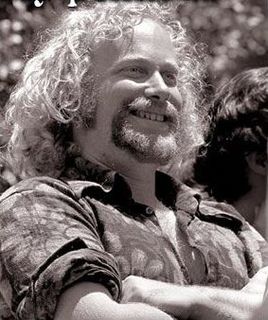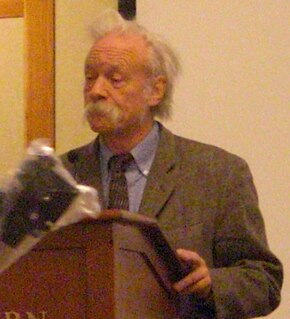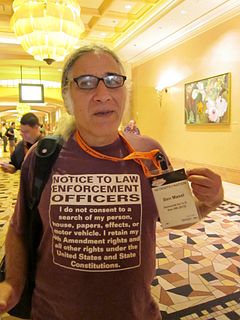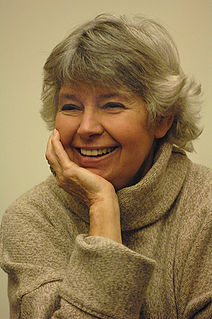 W
WThe Youth International Party (YIP), whose members were commonly called Yippies, was an American youth-oriented radical and countercultural revolutionary offshoot of the free speech and anti-war movements of the late 1960s. It was founded on December 31, 1967. They employed theatrical gestures to mock the social status quo, such as advancing a pig as a candidate for president of the United States in 1968. They have been described as a highly theatrical, anti-authoritarian and anarchist youth movement of "symbolic politics".
 W
WStewart Edward "Stew" Albert was an early member of the Yippies, an anti-Vietnam War political activist, and an important figure in the New Left movement of the 1960s.
 W
WIrvin Dana Beal is an American social and political activist, best known for his efforts to legalize marijuana and to promote the benefits of Ibogaine as an addiction treatment. He is a long-term activist in the Youth International Party (Yippies). He founded the Yipster Times in 1972. The newspaper, which was later renamed Overthrow in 1978, ended publication in 1989.
 W
WJudith Marjorie Collins is a Grammy Award-winning American singer and songwriter with a career spanning over 60 years. She is known for her eclectic tastes in the material she records and for her social activism. Collins has released 28 studio albums, 4 live albums, numerous compilation albums and 4 holiday albums.
 W
WSteven Conliff was a Midwestern-based Native American writer, historian, social satirist, alternative-media publisher and political activist in the 1960s and 1970s.
 W
WSteve DeAngelo, is an American cannabis rights activist and advocate for cannabis reform in the United States. DeAngelo is a globally recognized cannabis leader who was dubbed “The Father of the Legal Cannabis Industry” by former Speaker of the California Assembly & 41st Mayor of San Francisco, Willie L. Brown, Jr. He has organized grassroots community campaigns and appeared on national television networks advocating for legalization, and created a model medical cannabis dispensary.
 W
WIrwin Allen Ginsberg was an American poet and writer. As a student at Columbia University in the 1940s, he began friendships with William S. Burroughs and Jack Kerouac, forming the core of the Beat Generation. He vigorously opposed militarism, economic materialism, and sexual repression, and he embodied various aspects of this counterculture with his views on drugs, sex, multiculturalism, hostility to bureaucracy, and openness to Eastern religions.
 W
WJudy Gumbo Albert, known as Judy Gumbo, is a Canadian-American activist. She was an original member of the Yippies, the Youth International Party, a 1960s counter culture and satirical anti-war group, along with fellow radicals Anita and Abbie Hoffman, Nancy Kurshan and Jerry Rubin, and husband Stew Albert Judy received her nickname, "Gumbo," from Black Panther Party leader Eldridge Cleaver. Cleaver first referred to her as "Mrs. Stew," finding her refusal to use her husband's surname unacceptable. When Judy objected, Cleaver nicknamed her Gumbo, because "Gumbo goes with Stew."
 W
WAbbot Howard Hoffman, better known as Abbie Hoffman, was an American political and social activist who co-founded the Youth International Party ("Yippies") and was a member of the Chicago Seven. He was also a leading proponent of the Flower Power movement.
 W
WJill Johnston was an American feminist author and cultural critic who wrote Lesbian Nation in 1973 and was a longtime writer for The Village Voice. She was also a leader of the lesbian separatist movement of the 1970s. Johnston also wrote under the pen name F. J. Crowe.
 W
WPaul Krassner was an American author, journalist, comedian, and the founder, editor and a frequent contributor to the freethought magazine The Realist, first published in 1958. Krassner became a key figure in the counterculture of the 1960s as a member of Ken Kesey's Merry Pranksters and a founding member of the Yippies, and is even credited with coining the term as well. He died on July 21, 2019, in Desert Hot Springs, California.
 W
WWilliam Moses Kunstler was an American lawyer and civil rights activist, known for defending the Chicago Seven. Kunstler was an active member of the National Lawyers Guild, a board member of the American Civil Liberties Union (ACLU) and the co-founder of the Law Center for Constitutional Rights (CCR), the "leading gathering place for radical lawyers in the country."
 W
WBennett A. "Ben" Masel was an American writer, publisher, cannabis rights and free speech activist, expert witness for marijuana defendants, and frequent candidate for public office. A skilled chess player, Masel was director of Wisconsin NORML, and organizer of Weedstock and the annual Great Midwest Marijuana Harvest Festival which has been held in front of the Wisconsin State Capitol every autumn since 1971.
 W
WRobin Morgan is an American poet, author, political theorist and activist, journalist, lecturer, and former child actor. Since the early 1960s, she has been a key radical feminist member of the American Women's Movement, and a leader in the international feminist movement. Her 1970 anthology Sisterhood is Powerful has been widely credited with helping to start the contemporary feminist movement in the US, and was cited by the New York Public Library as "One of the 100 Most Influential Books of the 20th Century." She has written more than 20 books of poetry, fiction, and nonfiction, and is also known as the editor of Ms. magazine.
 W
WPhilip David Ochs was an American protest singer and songwriter who was known for his sharp wit, sardonic humor, political activism, often alliterative lyrics, and distinctive voice. He wrote hundreds of songs in the 1960s and 1970s and released eight albums.
 W
WDavid Peel was a New York City-based musician who first recorded in the late 1960s with Harold Black, Billy Joe White, George Cori and Larry Adam performing as David Peel and The Lower East Side Band. His raw, acoustic "street rock" with lyrics about marijuana and "bad cops" appealed mostly to hippies and the disenfranchised.
 W
WDennis Robert Peron was an American activist and businessman who became a leader in the movement for the legalization of cannabis throughout the 1990s. He influenced many in California and thus changed the political debate on marijuana in the United States.
 W
WJonah Raskin is an American writer who left an East Coast university teaching position to participate in the 1970s radical counterculture as a freelance journalist, then returned to the academy in California in the 1980s to write probing studies of Abbie Hoffman and Allen Ginsberg and reviews of northern California writers whom he styled as "natives, newcomers, exiles and fugitives." Beginning as a lecturer in English at Sonoma State University in 1981, he moved to chair of the Communications Studies Department from 1988 to 2007, while serving as a book reviewer for the San Francisco Chronicle and the Santa Rosa Press-Democrat. He retired from his teaching position in 2011.
 W
WEdward "Ed" Rosenthal is a California horticulturist, author, publisher, and Cannabis grower known for his advocacy for the legalization of marijuana use. He served as a columnist for High Times Magazine during the 1980s and 1990s. He was arrested in 2002 for cultivation of cannabis by federal authorities, who do not recognize the authority of states to regulate the use of medical marijuana. He was convicted in federal court, but the conviction was overturned on appeal. Rosenthal was subsequently convicted again, but was not re-sentenced, since his original sentence had been completed.
 W
WJerry Clyde Rubin was an American social activist, anti-war leader, and counterculture icon during the 1960s and 1970s. During the 1980s, he became a successful businessman. He is known for being one of the co-founders of the Youth International Party (YIP), whose members were referred to as Yippies, and standing trial in the Chicago Seven case.
 W
WEdward Sanders is an American poet, singer, social activist, environmentalist, author, publisher and longtime member of the band the Fugs. He has been called a bridge between the Beat and hippie generations. Sanders is considered to have been active and "present at the counterculture's creation."
 W
WJohn Sinclair is an American poet, writer, and political activist from Flint, Michigan. Sinclair's defining style is jazz poetry, and he has released most of his works in audio formats. Most of his pieces include musical accompaniment, usually by a varying group of collaborators dubbed Blues Scholars.
 W
WPete Wagner is an American political cartoonist, activist, author, scholar and caricature artist whose work has been published in over 300 newspapers and other periodicals. His cartoons and activist theatrics have been the subject of controversy and frequent media attention.
 W
WPaul Franklin Watson is a Canadian-American conservation and environmental activist, who founded the Sea Shepherd Conservation Society, an anti-poaching and direct action group focused on marine conservation activism. The tactics used by Sea Shepherd have attracted opposition, with the group accused of eco-terrorism by both the Japanese government and Greenpeace. Watson is a citizen of Canada and the United States.
 W
WHugh Nanton Romney Jr., known as Wavy Gravy, is an American entertainer and peace activist best known for his role at Woodstock, as well as for his hippie persona and countercultural beliefs. He has reported that his moniker was given to him by B.B. King at the Texas International Pop Festival in 1969.
 W
WW.I.T.C.H., originally the acronym for Women's International Terrorist Conspiracy from Hell, was the name of several related but independent feminist groups active in the United States as part of the women's liberation movement during the late 1960s. The W.I.T.C.H. moniker was sometimes alternatively expanded as "Women Inspired to Tell their Collective History", or "Women Interested in Toppling Consumer Holidays", among other variations.
 W
W